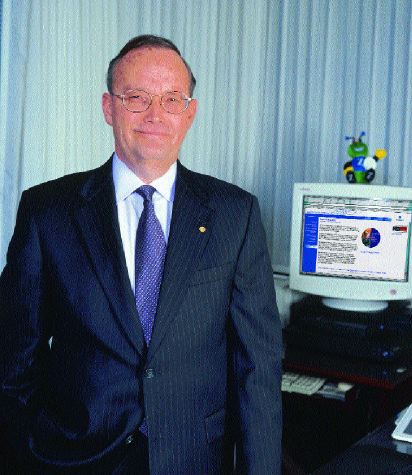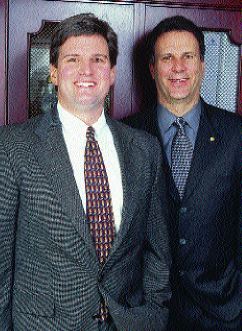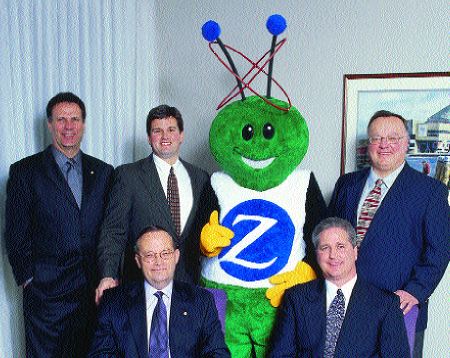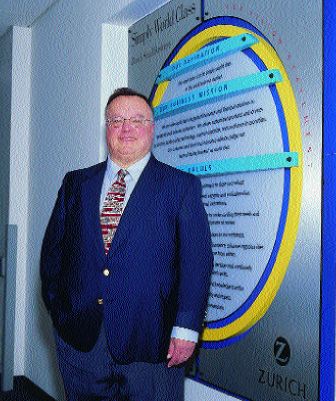

Raymond C. Thomas is president and chief executive officer of Zurich U.S. Small Business.
Here's the scene: It's 4:47 on Friday afternoon and your phone rings. It's one of your clients, in immediate need of coverage for a new work truck the business owner has purchased. The truck has to be ready to use on a job in a neighboring state on Monday morning. The office manager is adamant that coverage must be bound immediately to meet requirements of the Department of Transportation. You put the manager on hold, go online, process the endorsement, and send her off with the endorsement processed. You've provided five-star service, and your client is singing your praises.
What sometimes used to be an agonizing procedure taking as long as 90 days is quick and simple with the Zurich U.S. Small Business program. As part of its initiative to streamline transactions for its independent agents, Zurich U.S. is making its agents "electronic partners" in doing business via the Internet. The insurer describes this process as putting "the Power of the Internet in your hands." Agents enjoy 24/7 access to the insurer's Web site to perform a myriad of tasks: obtain quotes in minutes; finalize rates and create proposals; issue policies; access coverage information and billing; order supplies; register for training, and access agent manuals.
In literal terms, insurance is about the transfer of risk--but ultimately it's about peace of mind for the policyholder. An agency owner who can rely on quick, accurate processing is one who can provide clients peace of mind, and likely will enjoy increased retention and profits. Profitability and a sustainable increase in margins is what it's all about.
To promote its Net-based small business program, Zurich U.S. created marketing materials that feature ZETA (Zurich Ease Through Automation), a cartoon-like character that has appeared in print advertisements in industry publications. ZETA is actually the technology that allows agents to interface with Zurich U.S. The ads emphasize simplicity as a benefit to the agent and downplay the technological aspects of ZETA.
Job One: streamlining
Formed in January 1999, the Zurich U.S. Small Business unit brought together the small construction and small business operations of Zurich-owned Maryland Casualty Company. The goal was to focus the organization more strongly on the U.S. small commercial insurance market. The management team is led by Ray Thomas, president and CEO, who has more than 30 years' experience in the property/casualty industry. Also overseeing the process are Ron Gorman, president of western operations; Steve Peeters, president of eastern operations; and Bill Griglock, senior vice president of marketing.
Zurich U.S. streamlined the process of writing commercial insurance for the small business owner by offering a broad range of products for construction businesses, wholesale and retail establishments, institutions, professional offices, manufacturers and service businesses.
"We started mainly with builders risk three years ago and it has been wildly successful," Thomas says. "We've Web enabled almost every coverage. We expect workers compensation to go live online where eligible by May of this year."
 Steven J. Peeters (left) is president of Eastern Operations for the Zurich U.S. Small Business unit. Ron Gorman is president of the unit's Western Zone.
Steven J. Peeters (left) is president of Eastern Operations for the Zurich U.S. Small Business unit. Ron Gorman is president of the unit's Western Zone.
For agents only
The Zurich U.S. Small Business program is offered solely through the independent agency distribution system. Business is written by a nationwide network of 51 branch offices, each of which is under the leadership of a field vice president. "We're in every state right now except Hawaii," Gorman says. "We consider ourselves a premier writer of builders risk on all sizes of construction risk."
An agency service center in Jacksonville, Florida, called Zurich Insurance Services, focuses on processing and provides back end support for the field offices.
Once a submission arrives over the Internet at the processing center, it moves through an automatic underwriting system (which flags for field office review any submission that doesn't meet structured underwriting guidelines). If the submission is accepted, a policy is automatically issued and the billing cycle begins. The process in Jacksonville is completed overnight, and the policy is sent to the agent.
If the input process is successful and the submission is not held for underwriting reasons, Gorman says, the policy can be issued in as little as 10 to 15 minutes. "What used to be a 30-60-day period is down to about the same amount in minutes," he says.
"The immediacy of our platform and process is what is crucial for the agents," Griglock comments. "While the producer is on the telephone with the customer, he or she or the customer service representative can be entering data into the Zurich U.S. Internet platform and have a quote back within five minutes while they have the customer still on the telephone. If the customer buys, they can go directly to issuance, it goes on our direct bill system, and the billing cycle begins. Total advantage: the agent."
Five simple steps
During initial development of the program, Griglock says, Zurich U.S. enlisted an outside consultant to analyze and track the steps a new business submission goes through to get on the books in the traditional process. The consultant defined 13 major steps that the producer had to perform to issue a new policy. In the new Internet-based platform, Griglock says, eight of those steps are eliminated, leaving five simple steps to complete the process.
What specific advantages does the new platform offer? First, an agency's cost to process a new submission has been drastically reduced, and the time saved can be used for lead generation and qualifying prospects, thus increasing the amount of business submitted. Once the quote comes from Zurich U.S., the producer has an instant proposal in hand and can simply walk into the client's office ready for the presentation. The rapid automated submission handling process eliminates the need for the producer or support staffers to put a proposal together before hitting the field.

"The producer spends more time generating and following up on leads, setting appointments, counseling customers regarding needs, and issuing policies and ultimately endorsements correctly the first time," Peeters says. "All interim steps for customer service representatives are eliminated. Producers have more time to make money and control their own destiny."
Praise from an agent
Gil Bennett is president and CEO of the Fisher Brown Agency in Pensacola, Florida. His agency has worked with the Zurich U.S. Small Business unit since it was formed. The agency focuses on small business accounts in the Florida panhandle. It has five offices that wrote
$1.7 million in commercial premiums with Zurich U.S. in 1999 and almost $2 million last year. "The nicest thing is the simple, time-saving advantage of getting a Zurich quote in the form of a proposal from the start," Bennett observes. In 1999, Fisher Brown, which was established more than 90 years ago, was Zurich U.S.'s fourth leading writer of small business in the country based on premium volume.
Belinda Rogers is Fisher Brown's commercial marketing representative who oversees a majority of the accounts the agency places with Zurich U.S. Small Business. "It's so easy to do business with Zurich U.S.," Rogers says. "Their system is ahead of other carriers. Our agency represents about 20 carriers, and we were so excited when Zurich introduced its Internet platform last year. Right now, they're the leaders in the industry as far as we're concerned."
She adds that the ease of working with the Zurich U.S. system, coupled with the degree of binding authority the program gives the agent, streamlines the entire new business process. Turnaround time, she notes, is usually within 24 hours.
"Zurich U.S. is very progressive," Rogers adds. "Agents appreciate the time and effort they save by having the automated system process each risk. Theirs is a truly Internet-based system, whereas several other carriers use the Internet only to add a communication platform to a system that's already in place."
Bennett, a producer with 40 years' experience, adds that the Zurich U.S. policy forms and coverage are typically broader than those of other carriers, providing additional benefits to the consumer.
Fisher Brown Agency takes advantage of Zurich U.S.'s extensive research by identifying profitable niche classes, then developing a plan to pursue those classes aggressively. Support staffers single out those classes of risk first by SIC code, then by geographic region within the Panhandle.
The retention rate for Fisher Brown's business with Zurich U.S. is between 94% and 96%, Bennett says. Direct bill policies by nature simply move into the next term, the customer is billed directly from the carrier, and the producer doesn't have to worry about collecting the premium or down payment. Not having to handle these tasks, Bennett observes, allows the producer to function as a true agent. "More time is spent selling, and less time is spent collecting money and explaining bills," he says.
World class growth
Zurich U.S. Small Business saw a 35% growth in new business last year to $895 million, from just $90 million in 1992,and it expects to exceed $1.1 billion in written premium in 2001. Zurich U.S., Gorman says, is "very happy with this performance and growth."
Thanks to the streamlined submission process, by the fourth quarter of last year the percentage of small business policies issued via the Internet was consistently above 70%.
Zurich U.S.'s e-business activity report tracks, among other items, the number of current registered Web site users. As of January 1, 2001, it reported 22,535, with 9,771 registered agencies and a total of 144,582 visits in January alone.
Listening to agents
A key to the success of Zurich U.S. Small Business is that the insurer regularly conducts producer training throughout the country. In a typical year it conducts some 350 workshops for producers from coast to coast.
Agents are pleased with the speed and simplicity of our systems, according to Griglock. In particular, they appreciate the reporting form under our Builders Risk policy which the system generates for their contractor clients, Griglock says. Once the policy is in force, the builder receives the reporting form, which helps Zurich U.S. determine how many building starts it has for a given month. Then the customer pays based on the number of starts as it goes through the policy term. So the amount he/she pays is based on the amount of work (or true exposure) presented. If a builder encounters a slow period, the premium would reflect that.
"Customers began asking for more billing options," Griglock adds. "We introduced check by phone where customers are able to enter their banking information into the system and pay us that way. Or they can pay by credit card, and even some receive and pay their bills by e-mail over the Internet. It's all part of our strategy that's focused on ease of doing business. We call it one and done."
 "We appointed 1,306 new agents in 2000. We're looking to grow agency representation, particularly outside metropolitan areas. Unlike some of our competitors, we're interested in smaller town, rural agents."
"We appointed 1,306 new agents in 2000. We're looking to grow agency representation, particularly outside metropolitan areas. Unlike some of our competitors, we're interested in smaller town, rural agents."
Wide range of classes
Overall, Zurich U.S. Small Business writes a total of 450 different classes, all of which take advantage of its Internet platform and the ease with which it has streamlined its methods of doing business. Griglock remarks, "Our message to agents is that Zurich U.S.'s product advantages and wide range of available coverages translate to sales conversions with high hit ratios and ultimately commission for the agent with a minimal amount of work."
The number of agents who represent Zurich U.S. for the Small Business program has been growing at a rapid rate. "We appointed 1,306 new agents in 2000," Griglock says. "We're looking to grow agency representation, particularly outside metropolitan areas. Unlike some of our competitors, we're interested in smaller town, rural agents. We believe small businesses are looking for local advice and we need agency representation where business is. Obviously we're looking to find agents focusing on the small business market. Small business for most independent agents in small town America is their bread and butter. There are thin margins for agents, and Zurich U.S. Small Business must be easy to place that business with. We developed the whole value proposition around that concept. We had to become the easiest company for agents to place their small business with." To obtain an appointment with Zurich U.S., Griglock says, an agency must generate $150,000 in booked premium within two years.
Selling the Net for small business
An initial concern, Griglock says, was determining what level of Internet accessibility existed in a the majority of agencies. "CSRs were typically using the Internet to process personal lines business, but not commercial--not even small commercial," he says. "Soon after that Zurich U.S. launched a 'Get Wired' campaign. At first we thought we'd have to do a lot of selling of Internet concepts and functionality to agents. We championed the concepts by introducing our plans at about 60 agent meetings that Ray Thomas personally attended from February 1 through June, and we got the message to over 8,000 people from 5,000 agencies."
Thomas' first hand involvement was key to the early success of the program. "We met with the 8,000 agency people in a five-month period," Thomas says. "I've had 32 years of insurance experience, and this was something I really got excited about. The most important message of our program is about agency profit margins and how agents can use our efficiencies to increase those margins. It's all about wealth accumulation and the minimization of steps it takes to get a risk on the books. In addition to the principal and producers, we highly value the input of the CSRs. This business goes to companies that they find easy to work with.
"Previously it was very expensive. Now with conversion times continually dropping because of new platforms, revenue generation on the producer's part is greater. Independent agents are no longer confused by the idea of the Internet. They get it. The concept of self-service and increased margins is gaining wide acceptance."
Thomas refers to a "Future One" study released by the Independent Insurance Agents of America in May 2000 that shows the remarkable migration of agents to the Internet in a two-year period. Thomas says agents today are young, hungry, and impatient. "It's the new marketing 'moxie,' and agents of the future will be better equipped with our platform than with exclusive or direct writers.
"Our strategy played out exactly as we'd planned. Agents began asking about the importance of high-speed connectivity and our point was get as much as you can afford if you're going to write volume with us, ISDN and DSL was a must for submitting commercial applications. It was critical. Now satellite is available for high speed connections in the more remote areas."
More functionality was added later in 2000 with online endorsement processing. By the end of December 2000, 10,000 endorsements had been completed online in the month alone, contributing to the total of 20,000 online in the fourth quarter of 2000. Agents also gained the ability to do several kinds of inquiries online.
Peeters indicates that based on agent feedback, Zurich U.S. designed its systems around the traditional ACORD forms. However, it has streamlined the information requested by tying it to the specific class of risk. Why ask if a lawyer has exposure to explosives, for example.
Gorman asserts that before the advent of Internet technology, it was typically difficult for a property/casualty carrier and agent to be profitable in the small business arena. "The margins weren't there. With the Internet and other evolving efficiencies, we're seeing not only ourselves but others going back to that market. Now we are finding we can be profitable with models similar to the personal lines base, and once the business is on the books we focus on high retention."
A look ahead
The Zurich U.S. Small Business program also can enhance the agent's ability to offer clients additional coverages and services. "There are other needs for financial protection in the big picture," Griglock says. "If we can easily find a way to sell life coverage through the same platform, and other products like disability and 401(k), all of a sudden the value and profitability of our program goes up significantly. We're beginning to develop, test, and roll out other Zurich products in the same easy-to-use format so that producers can round out accounts."
Zurich U.S. has already begun doing this in selected states in pilot mode by offering agents the ability to sell term life to business owners through Zurich Life and disability coverage through Zurich U.S. Specialties.
The selling tool becomes a more complete canvas based on products tied to the next generation of technology--the Internet platform.
Helping to heighten Zurich U.S.' momentum is recent public recognition. It was recently named one of the top 100 leaders in a new business research series, Innovation 100: The Customer. Information Week and global consulting firm Cap Gemini Ernst & Young produced the series. The report spotlights businesses that define and implement innovative customer-centric business and technology strategies.
Wired and happy
Key to the success of the Zurich U.S. automated Small Business program, Gorman says, is agents' eager embrace of technology. "They're using laptop computers, wireless portable printers, PALM pilots, and cell phone technology that allows connectivity to obtain a quote and print an instant proposal right at the client's desk. Never before has the producer had this ability," he remarks.
Peeters notes that independent agents now face no time limits in their work. "Agents can do business from their house or car, 24/7," he says. "They are in control of their destiny. We focus on this functionality and before we get where we're going, we validate and test with agents and find out if what we want to do is working for them."
"As technology becomes more cost effective, the process will get smoother and smoother," Thomas says. "Agents can look for us, and we'll be at the cutting edge." *
The author
Brett Hanavan is a San Diego, California-based freelance journalist and a former staff writer for Insurance Journal West.
For more information
zurichus.com